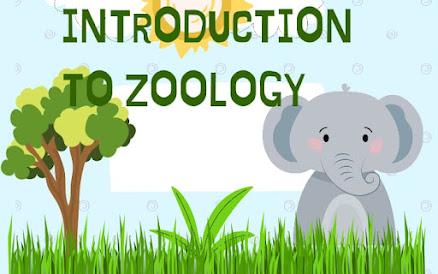"What is Zoology , it's History and Fields of study?"
Zoology is that branch of science which deals with the study of animals both that are living or become extinct ,moreover about their behaviour, structure, physiology, classification, and distribution their distribution.
Derivation of Word Zoology
The term is derived from Greek word ζῷον, zōion ('animal'), and λόγος, logos ('knowledge')
History of Zoology
The history of zoology traces the study of the animal kingdom from ancient times to modern times. Prehistoric people needed to study the animals and plants around them to exploit them and use them for their survival .
The "Neolithic Revolution", which is distinguished by the domestication of the animals, continued during the Antiquity period. Ancient knowledge of wildlife is illustrated with realistic depictions of wild and domesticated animals from the Near East, Mesopotamia, and Egypt, including herding, hunting, and fishing practices and methodologies . .
Although the concept of zoology as a single field become visible much later, the zoological sciences grew out of natural history dating back to the biological works of Aristotle and Galen in the ancient Greco-Roman world. Aristotle, in the fourth century BC. J.-C., contemplate animals as living organisms by studying their structural , developmental characteristics . He divided them into two groups, animals with blood (vertebrates), and animals without blood (invertebrates). About four hundred years after , the "Roman physician Galen" dissected animals to study their anatomy and the function of different parts.
The "Neolithic Revolution", which is distinguished by the domestication of the animals, continued during the Antiquity period. Ancient knowledge of wildlife is illustrated with realistic depictions of wild and domesticated animals from the Near East, Mesopotamia, and Egypt, including herding, hunting, and fishing practices and methodologies . .
Although the concept of zoology as a single field become visible much later, the zoological sciences grew out of natural history dating back to the biological works of Aristotle and Galen in the ancient Greco-Roman world. Aristotle, in the fourth century BC. J.-C., contemplate animals as living organisms by studying their structural , developmental characteristics . He divided them into two groups, animals with blood (vertebrates), and animals without blood (invertebrates). About four hundred years after , the "Roman physician Galen" dissected animals to study their anatomy and the function of different parts.
During the "Post-classical era", the "Middle Eastern science" and "Medicine" were very famous in the world, incorporating concepts from ancient Greece, Rome, Mesopotamia, and Persia, as well as the ancient Indian tradition of Ayurveda, while achieving many breakthroughs and innovations. The thirteenth century, Albertus Magnus produced commentaries and paraphrases on all of Aristotle's works; his books on topics such as botany, zoology, and minerals included information from ancient sources, but also the results of his own research.
During the Renaissance and early modern period zoological thought was revolutionized in Europe by a renewed interest in empiricism and the discovery of many new organisms. The main performers in this movement were Andreas Vesalius and William Harvey, who used experimentation and careful observation of physiology,. Antonie van Leeuwenhoek did revolutionary work in microscopy and revealed the previously unknown world of microorganisms, providing the basis for cell theory van Leeuwenhoek's observations were supported by Robert Hooke; all living organisms were composed of one or more cells and could not generate spontaneously. An important theory calleds as "The cell theory" provided a new point of view on the fundamental basis of life.
Once the domain of gentleman naturalists, zoology became during the 18th, 19th, and 20th centuries an increasingly professionalized scientific discipline.







0 Comments